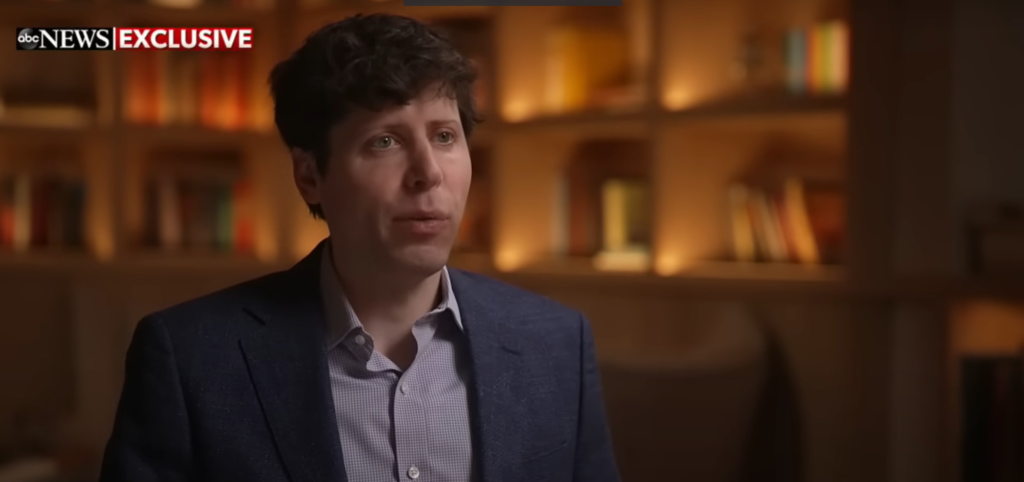Video Link: Sam Altman on AI and Its Societal Impact
Introduction
In this video, Sam Altman delves into the potential and challenges of artificial intelligence (AI). The CEO highlights AI’s outstanding creative and learning faculties. Additionally, he expounds on the significance of the judicious deployment of AI.
Summary
Sam Altman, CEO of OpenAI, discusses the profound impact of artificial intelligence on society. He addresses both the potential benefits and the risks associated with AI, emphasizing the importance of responsible development and deployment of AI technologies.

Key Takeaways
- Transformative Potential: Altman highlights how AI can revolutionize industries, from healthcare to finance, by improving efficiency and creating innovative solutions.
- Economic Shifts: AI’s integration will lead to significant economic changes, including job displacement and the emergence of new career fields requiring advanced skills.
- Ethical Considerations: He stresses the importance of developing ethical AI systems that are fair, transparent, and free from bias to ensure they benefit all of humanity.
- Global Challenges: Altman believes AI can play a crucial role in addressing global challenges like climate change and poverty, providing scalable solutions to complex problems.
Q&A Section 1
- Q: How can AI improve healthcare?
- A: AI has the potential to enhance diagnostics, tailor treatment plans, and streamline administrative tasks, thereby improving patient care and health outcomes.
- Q: What are the economic implications of AI?
- A: The advent of AI is set to disrupt traditional job markets, requiring the development of new skills and creating opportunities in emerging technology sectors.
- Q: What ethical issues need addressing in AI development?
- A: It is essential to ensure that AI systems are transparent, unbiased, and fair to prevent societal harm and foster trust.
- Q: How can AI be used for global good?
- A: AI can contribute to solving global challenges by offering innovative solutions, such as optimizing resource management and developing technologies to combat climate change.
- Q: What are the potential benefits of AI?
- A: AI offers substantial benefits, including the enhancement of creativity, learning, and problem-solving. It can inspire individuals and organizations to reach new heights through experimentation and creative applications. AI models like ChatGPT can generate ideas, engage in conversations, and assist with various tasks, thus augmenting human capabilities.
- Q: What are the concerns about AI’s misuse?
- A: Misuse of AI raises serious concerns, such as the risk of widespread disinformation and cyber attacks. The CEO of OpenAI emphasizes the importance of societal adaptation through low-stakes experiments to mitigate AI-related risks. OpenAI is committed to making its models less likely to follow harmful instructions and to intervene at the pre-training stage.

Q&A Section 2
- Q: How can society adapt to AI’s impact?
- A: Society must engage in thoughtful policy-making and regulation to ensure that AI’s benefits outweigh its risks. This involves understanding AI’s capabilities and limitations, as well as the ethical implications of its use. OpenAI advocates for societal engagement to determine the appropriate balance and boundaries for AI development.
- Q: What role does OpenAI play in AI development?
- A: OpenAI is dedicated to the responsible development of AI, incorporating public input and safety measures to mitigate potential harms. The CEO highlights the necessity of cautious and responsible deployment, stressing the importance of ongoing learning and adaptation. OpenAI’s strategy includes releasing AI models in a controlled manner to facilitate learning and improvement over time.
- Q: How can AI transform education?
- A: AI has the capacity to revolutionize education by offering personalized learning experiences that adapt to each student’s style and pace, enhancing understanding and engagement. OpenAI’s CEO views AI as an empowering tool for both teachers and students, capable of transforming traditional educational dynamics and enriching the learning experience.
- Q: What are the ethical considerations for AI development?
- A: Ethical considerations in AI development encompass balancing benefits and risks, ensuring responsible use, and addressing societal impacts. OpenAI’s CEO stresses the importance of public engagement and ethical guidelines to secure a positive future for AI. The discussion underscores the need for responsible governance and ethical AI development to maximize benefits and minimize potential harms.
Conclusion
AI’s impact on society is uncertain but promising, with potential benefits and risks. OpenAI’s CEO discusses the importance of public engagement and responsible AI development to ensure its positive future. The conversation underscores the need for societal adaptation to AI, balancing its benefits with responsible governance
